The United States Armed Forces are the military forces of the United States. The armed forces consists of six service branches: the Army, Marine Corps, Navy, Air Force, Space Force, and Coast Guard. All six armed services are among the eight uniformed services of the United States.

The Marine Corps Air Ground Combat Center (MCAGCC), also known as 29 Palms, is the largest United States Marine Corps base. The base covers a total area of 596,288 acres.

III Marine Expeditionary Force is a formation of the Marine Air-Ground Task Force of the United States Marine Corps. It is forward-deployed and able to rapidly conduct operations across the spectrum from humanitarian assistance and disaster relief (HA/DR) to amphibious assault and high-intensity combat.

United States Marine Forces Special Operations Command (MARSOC) is a component command of the United States Special Operations Command (SOCOM) that comprises the Marine Corps' contribution to SOCOM. Its core capabilities are direct action, special reconnaissance and foreign internal defense. MARSOC has also been directed to conduct counter-terrorism and information operations.
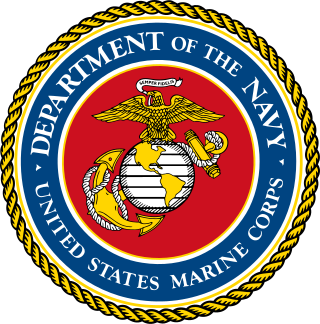
The United States Fleet Marine Forces (FMF) are combined general- and special-purpose forces within the United States Department of the Navy that perform offensive amphibious or expeditionary warfare and defensive maritime employment. The Fleet Marine Forces provide the National Command Authority (NCA) with a responsive force that can conduct operations in any spectrum of conflict around the globe.

The United States Marine Corps is organized within the Department of the Navy, which is led by the Secretary of the Navy (SECNAV). The most senior Marine commissioned officer is the Commandant of the Marine Corps, responsible for organizing, recruiting, training, and equipping the Marine Corps so that it is ready for operation under the command of the unified combatant commanders. The Marine Corps is organized into four principal subdivisions: Headquarters Marine Corps, the Operating Forces, the Supporting Establishment, and the Marine Forces Reserve.

Marine Corps Systems Command (MCSC) is the acquisition command of the United States Marine Corps, made up of Marines, sailors, civilians and contractors. As the only systems command in the Marine Corps, MCSC serves as Head of Contracting Authority and exercises technical authority for all Marine Corps ground weapon and information technology programs. MCSC is headquartered at Marine Corps Base Quantico.

General Vernon Edgar Megee was a United States Marine Corps general. He is recognized as a pioneer in the development of close air support for ground combat operations. He served as Assistant Commandant of the Marine Corps from 1956 to 1957; with his final billet from 1957 to 1959 as commanding general, Fleet Marine Force, Pacific. When he retired from the Marine Corps, after 40 years of active duty service, he received a promotion to 4-star rank.
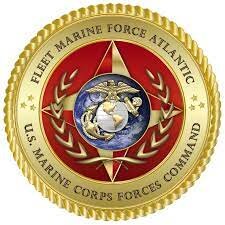
Fleet Marine Force, Atlantic (FMFLANT) is an American maritime landing force that is spread across the Atlantic Ocean. It is headquartered at Naval Station Norfolk and directs and commands all the subordinate elements of the Navy Expeditionary Strike Force and Marine Air-Ground Task Force components that follow under the 2nd, 4th, and 6th Fleet and the Marine Forces Command (MarForCom). The Commanding General of Marine Forces Command is dual-posted as the Commanding General of the Fleet Marine Force, Atlantic. FMFLANT is under operational control of the Commander-in-Chief, United States Fleet Forces Command, when deployed.

United States Marine Forces, South, headquartered in Miami, Florida, is the Marine Corps service component of the United States Southern Command.

The United States Marine Corps (USMC), also referred to as the United States Marines, is the maritime land force service branch of the United States Armed Forces responsible for conducting expeditionary and amphibious operations through combined arms, implementing its own infantry, artillery, aerial, and special operations forces. The U.S. Marine Corps is one of the eight uniformed services of the United States.

The Marine Raider Regiment (MRR), formerly known as the Marine Special Operations Regiment (MSOR), is a special operations forces of the United States Marine Corps, which is a part of Marine Corps Special Operations Command (MARSOC). Renamed for its predecessor, the World War II Marine Raiders, this unit is the principal combat component of MARSOC, which is the Marine Corps' contribution to the United States Special Operations Command (USSOCOM).

James Profit Riseley was a decorated officer of the United States Marine Corps, who reached the rank of lieutenant general. He is most noted as commanding officer of the 6th Marine Regiment during World War II. He later commanded 3rd Marine Division or Marine Corps Base Camp Lejeune.

Henry William Buse Jr. was a lieutenant general in the United States Marine Corps. He was Chief of Staff, Headquarters Marine Corps and later commanding general of the Fleet Marine Force Pacific. Following his retirement from the Marine Corps, Buse served as assistant to three former presidents of the U.S. Olympic Committee.

Austin Roger Brunelli was a highly decorated combat veteran of World War II and the Korean War. As the commanding officer of the 1st Battalion, 24th Marines during the Battle of Iwo Jima, he was awarded the Navy Cross, the United States military's second-highest decoration awarded for valor in combat. He later served as chief of staff of the 1st Marine Division in Korea and commanding general of Camp Lejeune.

George Franklin Good Jr. was a decorated officer of the United States Marine Corps with the rank of lieutenant general. Good is most noted for his service as commander of the Marine Defense Force of Funafuti during World War II and later as commanding general of Department of the Pacific.
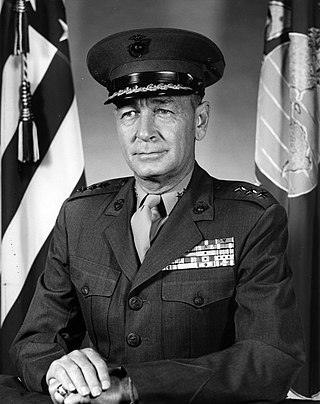
Richard Garfield Weede was a highly decorated officer of the United States Marine Corps with the rank of lieutenant general. He served in World War II, Korea and during the early phase of Vietnam War and completed his career as commanding general of Fleet Marine Force, Atlantic.
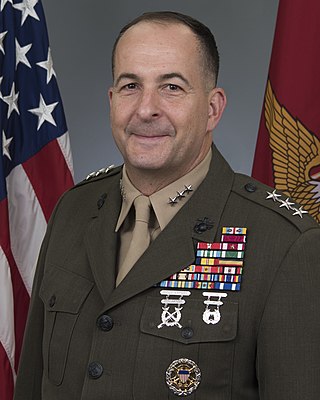
Daniel J. O'Donohue is a retired U.S. Marine lieutenant general. O'Donohue previously served as commanding general of 1st Marine Division and commanding officer of 1st Marine Regiment.

Ralph Kaspar Rottet was a decorated officer and naval aviator in the United States Marine Corps with the rank of lieutenant general. A veteran of World War II, where he distinguished as commanding officer, Marine Aircraft Group 31, he later rose to through the ranks and completed his career as Deputy Chief of Staff for Plans and Programs at Headquarters Marine Corps in 1968.
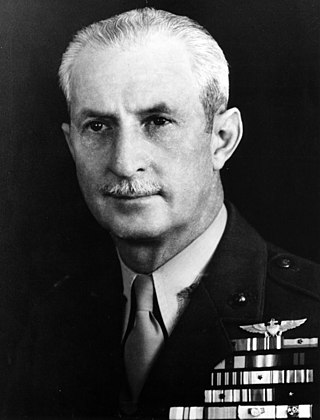
Hayne Davis Boyden was a highly decorated Naval aviator and aviation pioneer in the United States Marine Corps who retired at the rank of Brigadier General. A veteran of several campaigns of the Banana Wars, Boyden became known in the Marine Corps as a pioneer in Aerial photography. He photographed thousands of square miles of Cuba, Haiti, Nicaragua, Panama and the Olympic forestry region of the Pacific northwest. This aerial photography became the basis for mosaic maps of these areas.


















